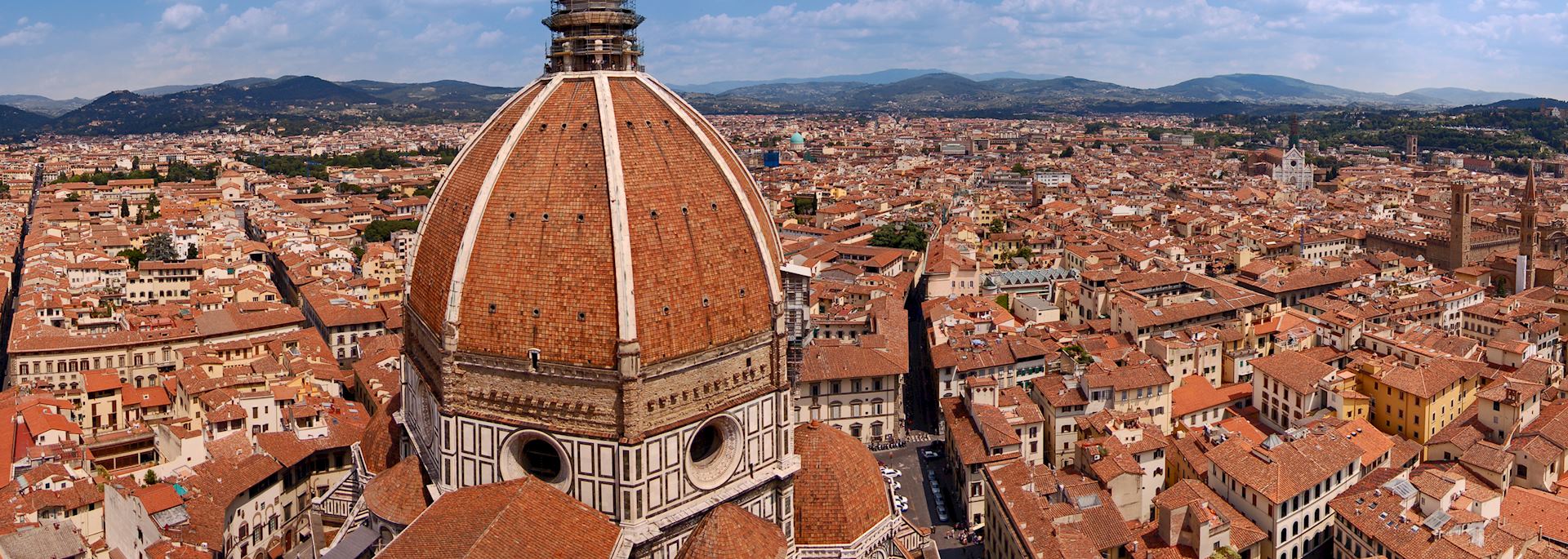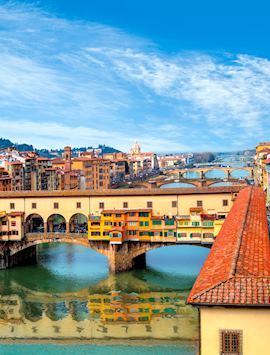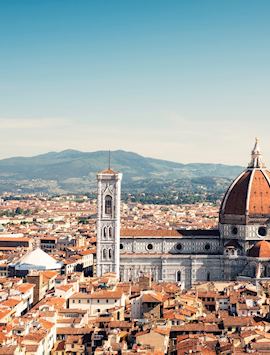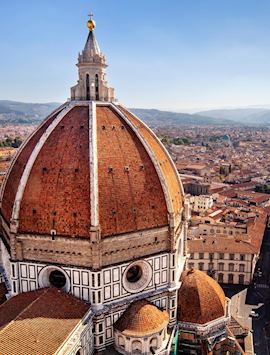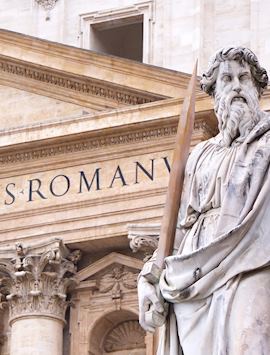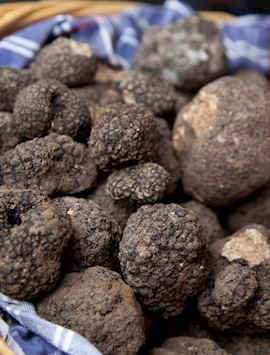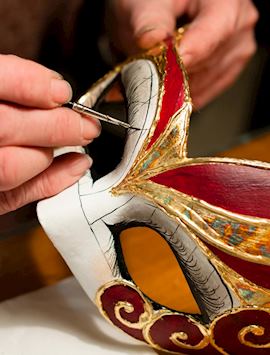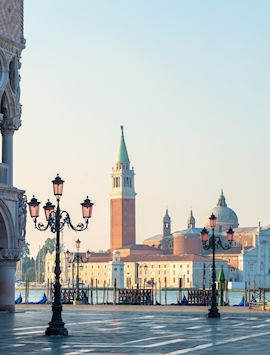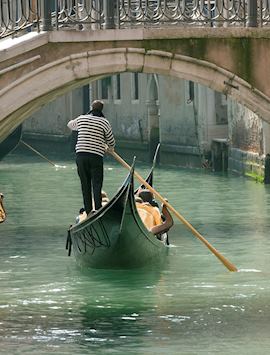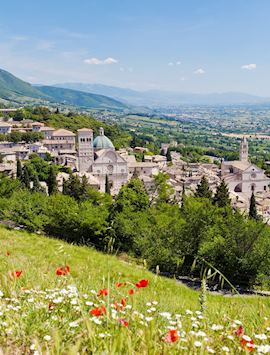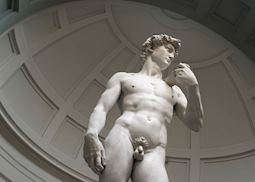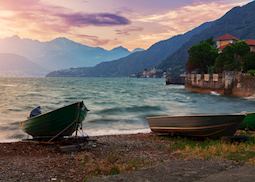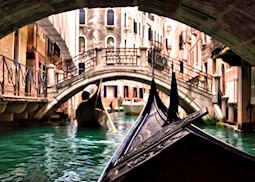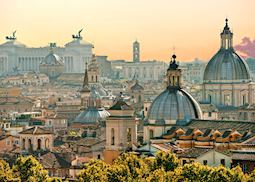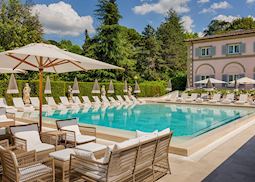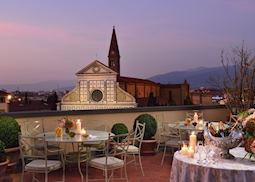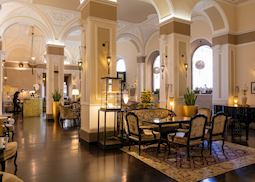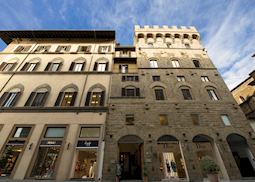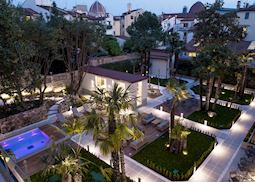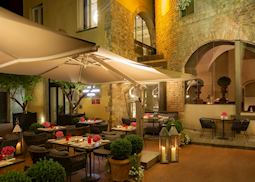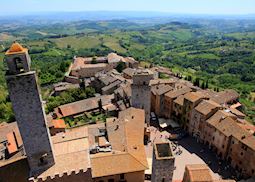Jump to:
Situated on the banks of the Arno amid the Tuscan hills, Florence is celebrated for its art, history and architecture. The powerhouse of the Renaissance, today the city is a living gallery. The ochre dome of the Duomo dominates the skyline, while the Accademia and Uffizi museums house works such as Michelangelo’s David and Botticelli’s Primavera.
Relatively compact and easy to explore, Florence is a city of stately palazzos and elegant piazzas, connected by narrow, winding lanes full of cafés and artisan shops. It’s a place where even the smallest church, tucked out of the way down backstreets, can contain an artistic masterpiece.
Italy specialist ClaireFlorence is a genteel city of galleries and churches, where fine art lovers are in their element. I like visiting the smaller, lesser-known art museums, like the Bargello, to study celebrated pieces without the crowds.
Things to see and do in Florence
Climb to the top of the Duomo
The Cattedrale di Santa Maria del Fiore, or Florence’s Duomo, was commissioned around 1294 to demonstrate the city’s wealth and status. Nineteenth-century Florence gave it a neo-Gothic facelift of pink, white and green marble.
The dome was a 15th-century addition, the design of a young architect named Brunelleschi, who had previously lost out to his contemporary Ghiberti in a competition to create the cathedral’s baptistery doors. His creation is arguably the most technically impressive and visually striking example of Renaissance architecture in existence.
If you’ve the head for it, climb up into the heart of the dome. It offers a close-up view of Vasari’s frescoes portraying the Last Judgement on the dome’s interior, before you head outside for panoramic views over the city. The campanile (bell tower), designed by Giotto, stands separately at one end of the cathedral. It’s equally worth the climb for a view that includes the Duomo.
Explore the lesser-visited sights of Piazza del Duomo
The baptistery
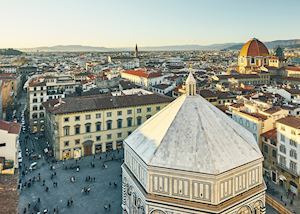 The cathedral’s baptistery is said to be the oldest building in Florence, thought to have originated as a 6th- or 7th-century Roman temple. Different generations of Florentines have since sought to embellish it.
The cathedral’s baptistery is said to be the oldest building in Florence, thought to have originated as a 6th- or 7th-century Roman temple. Different generations of Florentines have since sought to embellish it.
Ghiberti designed the gilded bronze doors, known as the ‘gates of paradise’ — the originals are now on display in the Museo dell’Opera del Duomo, with replicas in their place. Inside, a mosaic of a human-devouring devil is said to have inspired Dante’s vision of hell in his Divine Comedy.
Museo dell’Opera del Duomo
Though most visitors bypass the museum, it safeguards precious relics from the Duomo, baptistry and campanile, such as a statue of Mary weeping over the body of Jesus by Michelangelo. He originally intended the pietà to be used on his own tomb. One day, in a fit of artistic despair, he’s thought to have partially destroyed it.
Donatello’s raw, harrowing statue of a penitent Mary Magdalene also features, along with choir lofts designed for the cathedral by Donatello and della Robbia. Brunelleschi’s original engineering equipment, used in the construction of the dome, is also on display.
Explore the Palazzo Vecchio on the Piazza della Signoria
Piazza della Signoria
The medieval square of Piazza della Signoria takes its name from the Signoria guild council, which has governed Florence since 1293. Over the centuries, it’s been a silent witness to many of the city’s most dramatic events.
It was here that religious zealot and Dominican friar, Savonarola, staged his bonfire of the vanities. Protesting against Florence’s sinfulness and apostasy, he called for citizens to burn manuscripts, priceless paintings, tapestries and other ornaments. Later, he was hanged from a cross and burned in the same square and his teachings outlawed.
Palazzo Vecchio
The fortress-like Palazzo Vecchio, on the east face of the piazza, was occupied by Cosimo I Medici in the 16th century before he moved his retinue to the Pitti Palace. Inside, it’s riddled with labyrinthine secret passageways that speak of the Medici dynasty’s Machiavellian grip on Florence.
The Palace’s museum lets you walk the corridors of power — don’t miss the gargantuan Hall of the 500, where 15th-century council assemblies were held. The palazzo is currently the seat of Florence’s city council.
Follow the art trail at the Uffizi, Bargello and Accademia Galleries
Uffizi Gallery
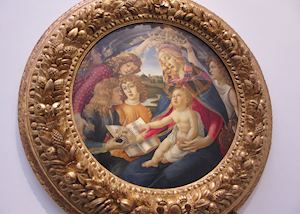 The collection of Renaissance artwork held in the Galleria degli Uffizi was mostly bought or commissioned by the Medici family. It was donated to Florence by descendant Anna Maria Ludovica on one condition: the art must not leave the city. Today, the Uffizi holds the paintings while the statuary is now located in the quieter Bargello art museum.
The collection of Renaissance artwork held in the Galleria degli Uffizi was mostly bought or commissioned by the Medici family. It was donated to Florence by descendant Anna Maria Ludovica on one condition: the art must not leave the city. Today, the Uffizi holds the paintings while the statuary is now located in the quieter Bargello art museum.
The list of artists exhibited within the Uffizi’s grand rooms reads like a roll call of Western masters. Greats like Fra’Angelico, Botticelli (including his Birth of Venus), Leonardo da Vinci, Michelangelo, Tintoretto, Titian, Veronese, and Raphael all feature. One of the collection’s lesser-known artists is Italian baroque female artist Artemisia Gentileschi. In her visceral and violent Judith Slaying Holofernes, her figure of Judith is thought to be a self-portrait.
Visitor numbers are limited and lines can be long, but this does have the advantage of reducing Louvre-style overcrowding.
Accademia Gallery
The Galleria dell’Accademia lies just off the Piazza San Marco. Its most famous resident, Michelangelo’s David, stands under a purpose-built glass dome. He originally graced the square outside the Palazzo Vecchio, where a replica now stands in his place.
Scholars admire the sculptor’s understanding of anatomy and scale but notice how his hands seem much bigger in proportion to his head. The statue was originally to have been displayed on a rooftop where, seen from below, the proportions would have made more sense.
The museum also contains Michelangelo’s Prigioni (either prisoners or slaves), initially intended for the tomb of Pope Julius II. The four writhing forms are unfinished and seem to struggle to escape the marble. Nearby, the first-floor cells of the Museum San Marco, a former 15th-century religious complex, feature some of the best examples of frescoes by Fra’Angelico.
Bargello
The Bargello, a 13th-century police station and former barracks, is situated just north of the Palazzo Vecchio. Among its sculptures is Michelangelo’s androgynous Bacchus, who (appropriately) looks like he’s reeling from too much wine.
Discover Florence’s historic Basilica Santa Croce
The colossal 14th-century Franciscan Church of the Holy Cross is the final resting place for many of Florence’s leading lights. Behind its marble neo-Gothic frontage lie the tombs of Michelangelo and Ghiberti, as well as the astronomer Galileo. His discoveries so riled Rome’s Inquisition that he was initially denied a Christian burial.
Look out for the memorial to the exiled Dante, who is buried in Ravenna, despite efforts to bring the Florentine poet home.
The piazza in front of the basilica was sometimes cleared for worshippers at times when the church was full. Throughout the Middle Ages, it hosted jousting and festivals.
Cross the Ponte Vecchio to Oltrarno
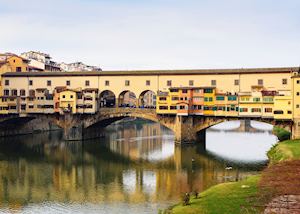 In 1944, the 14th-century Ponte Vecchio (old bridge) was the only bridge left standing by the Nazis following their retreat from Florence. It separates the historic central area of the city from the Oltrarno district — literally meaning the other (altro) side of the Arno.
In 1944, the 14th-century Ponte Vecchio (old bridge) was the only bridge left standing by the Nazis following their retreat from Florence. It separates the historic central area of the city from the Oltrarno district — literally meaning the other (altro) side of the Arno.
This side of the bridge tends to be quieter, and its maze of streets conceals many artisans’ workshops where the city’s historic crafts live on. We can arrange for a guided walking tour of these small shops, including a stop at a papermaker.
The Ponte Vecchio itself was originally home to grocers, fishmongers and butchers who would throw the unwanted by-products of their wares into the waters below. The stench became so bad that in the 16th century the bridge was turned over to gold and silversmiths.
The Vasari Corridor stretches across the top of the bridge and can be spotted snaking out of the side of the Uffizi. This covered walkway above the stalls allowed the Medicis to pass between the Palazzo Vecchio, Uffizi and Pitti Palace in comfort.
Stroll in the gardens of the Pitti Palace
Oltrarno’s sprawling Pitti Palace was home to city’s ruling families from the Medicis to the Savoys. Donated to the state in 1919, it’s now a museum complex. The Palatine Gallery is the biggest draw, containing opulently furnished apartments from the Medici and Savoy periods.
Outside, the Boboli Gardens spill down the hillside behind the palace. They’re a calm expanse of landscaped hedgerows, ponds, fountains, shaded groves and beds of lavender. More incongruous is Buontalenti’s grotto, with its fantastical Mannerist sculptures made out of stalactites and shells, which look as if they’re melting.
who's been there
-
01993 838 92501993 838 960
- Make an enquiry
Suggested itineraries featuring Florence
Our itineraries will give you suggestions for what is possible when you travel in Florence, and they showcase routes we know work particularly well. Treat them as inspiration, because your trip will be created uniquely by one of our specialists.
Places near Florence
- San Gimignano 24 miles away
- Siena 32 miles away
- Pisa 43 miles away
- Bologna 51 miles away
- Forte dei Marmi 56 miles away
- Modena 63 miles away
- Ravenna 66 miles away
- Perugia 73 miles away
- Porto Venere 74 miles away
- Cinque Terre 80 miles away
- Assisi 84 miles away
- Umbria 85 miles away
- Orvieto 85 miles away
- Parma 86 miles away
- Portofino and Santa Margherita 109 miles away
- Verona 117 miles away
- Sirmione 122 miles away
- Genoa 123 miles away
- Venice 128 miles away
- Lake Garda 131 miles away
- Gardone Riviera 133 miles away
- Rome 144 miles away
- Milan 156 miles away
- Barbaresco 171 miles away
- Madonna di Campiglio 172 miles away
- Alba 173 miles away
- Barolo 175 miles away
- Como 177 miles away
- Blevio 178 miles away
- Torno 179 miles away
- Laglio 180 miles away
- Lezzeno 182 miles away
- Bellagio 182 miles away
- Tremezzo 185 miles away
- Lake Como 185 miles away
- Dolomites 185 miles away
- Piedmont 195 miles away
- Alta Badia 198 miles away
- Turin 198 miles away
- Stresa 199 miles away
- Lake Maggiore 200 miles away
- Verbania 200 miles away
- Costa Smeralda 204 miles away
- Ischia 252 miles away
- Naples 255 miles away
- Herculaneum 259 miles away
- Pompeii 267 miles away
- Capri 270 miles away
- Sorrento 270 miles away
- The Amalfi Coast 277 miles away
- Sardinia 278 miles away
Photos of Florence
Our expert guides to exploring Florence
Written by our specialists from their own experiences of visiting Florence, these guides will help you make the most of your time there. We share both our practical recommendations and the best ways to appreciate Florence at its best.
-
Italy’s art cities: Venice, Florence and Rome ![Michelangelo's 'David', Florence]()
Italy’s art cities: Venice, Florence and Rome
Italy’s art cities: Venice, Florence and Rome
From classical Roman statues through Renaissance frescoes to modern installations, you can trace a complete history of Western art in Italy’s great cities. Specialist Kimberly talks about how to deal with the crowds as you take in these important works.
Read this guide -
A guide to the regions of Italy ![Local fishing boats, Lake Como]()
A guide to the regions of Italy
A guide to the regions of Italy
A tour of a private palazzo, or a cooking class with a Sorrento grandmother? We highlight the major sights and unearth lesser-known attractions for some of our best-loved Italian regions, spotlighting tours that really explore their character.
Read this guide -
Basilicas, cathedrals & churches in Italy’s art cities ![Cathedral Santa Maria del Fiore, Florence, Tuscany]()
Basilicas, cathedrals & churches in Italy’s art cities
Basilicas, cathedrals & churches in Italy’s art cities
The focal point of history and culture for over 2000 years, Italy is perhaps understandably also the world’s pre-eminent destination when it comes to its art and architecture. This guide highlights its basilicas, cathedrals and churches, and the priceless artworks contained within them.
Read this guide -
Honeymoons in Italy ![Gondola ride, Venice]()
Honeymoons in Italy
Honeymoons in Italy
Having got married in Tuscany, specialist Eva outlines some of the best honeymoon options across Italy. Would you and your spouse-to-be prefer pampering on the Amalfi Coast or living la dolce vita in Venice, Rome and Florence?
Read this guide -
Experience la dolce vita in Italy ![Rome skyline, Italy]()
Experience la dolce vita in Italy
Experience la dolce vita in Italy
The allure of Italy is endless, from local delicacies in Tuscany and historical architecture in Rome to the rugged coastline of the Amalfi Coast. With activities spanning every range of interests it can be difficult to know where to begin, but our Italy specialists have travelled the country to select the best of all Italy has to offer.
Read this guide
Accommodation choices for Florence
We've selected a range of accommodation options for when you visit Florence. Our choices usually come recommended for their character, facilities and service or location. Our specialists always aim to suggest properties that match your preferences.
-
![Villa Cora, Florence]()
Villa Cora
Florence -
![Master room, J.K. Place, Florence]()
The Place Firenze
Florence -
![Roof terrace, Hotel Santa Maria Novella, Florence]()
Hotel Santa Maria Novella
Florence -
![Front entrance, Hotel Degli Orafi]()
Hotel Degli Orafi
Florence -
![Hotel Bernini Palace, Florence]()
Hotel Bernini Palace
Florence -
![Antica Torre di Via Tornabuoni, Florence]()
Antica Torre di Via Tornabuoni 1
Florence -
![Palazzo Castri 1874, Florence]()
Palazzo Castri 1874
Florence -
![Hotel Brunelleschi, Outdoor patio]()
Hotel Brunelleschi
Florence
Ideas for experiencing Florence
Our specialists seek out authentic ways to get to know the places that could feature in your trip. These activities reflect some of the experiences they've most enjoyed while visiting Florence, and which use the best local guides.
-
Accademia and Uffizi Galleries walking tour ![Michelangelo's 'David', Florence]()
Accademia and Uffizi Galleries walking tour
Accademia and Uffizi Galleries walking tour
A full day guided walking tour around the highlights of Florence including the Santa Croce Basilica and the incredible Renaissance artwork of the Uffizi and Accademia Galleries.
View details -
Siena and San Gimignano tour with Tuscan farmhouse lunch ![Views over San Gimignano]()
Siena and San Gimignano tour with Tuscan farmhouse lunch
Siena and San Gimignano tour with Tuscan farmhouse lunch
Visit the beautiful medieval city of Siena before stopping in the countryside for a traditional Tuscan farmhouse lunch, followed by a visit to the hilltop town of San Gimignano.
View details -
Truffle hunting and tasting lunch ![Fresh truffles, Italy]()
Truffle hunting and tasting lunch
Truffle hunting and tasting lunch
A wonderful opportunity to visit a family truffle business, learn about the production process, go on a truffle hunt and enjoy a tasting lunch.
View details
